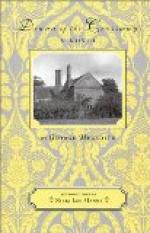There was no need for Redworth to run hunting the man at so late an hour, but he was drawn on by the similarity in dissimilarity of this devotee of a woman, who could worship her at a distance, and talk of her to everybody. Not till he beheld Raiser’s tall figure cutting the bridge-parapet, with a star over his shoulder, did he reflect on the views the other might entertain of the nocturnal solicitation to see ‘justice done’ to a lady’s new book in a particular Review, and the absurd outside of the request was immediately smothered by the natural simplicity and pressing necessity of its inside.
He crossed the road and said, ‘Ah?’ in recognition. ’Were you at the Opera this evening?’
‘Oh, just at the end,’ said Raiser, pacing forward. ’It’s a fine night. Did you hear her?’
‘No; too late.’
Raiser pressed ahead, to meditate by himself, as was his wont. Finding Redworth beside him, he monologuized in his depths: ’They’ll kill her. She puts her soul into it, gives her blood. There ’s no failing of the voice. You see how it wears her. She’s doomed. Half a year’s rest on Como . . . somewhere . . . she might be saved! She won’t refuse to work.’
‘Have you spoken to her?’ said Redworth.
’And next to Berlin! Vienna! A horse would be . . . .
I? I don’t know her,’ Raiser replied. ’Some of their women stand it. She’s delicately built. You can’t treat a lute like a drum without destroying the instrument. We look on at a murder!’
The haggard prospect from that step of the climax checked his delivery.
Redworth knew him to be a sober man in office, a man with a head for statecraft: he had made a weighty speech in the House a couple of hours back. This Opera cantatrice, no beauty, though gentle, thrilling, winning, was his corner of romance.
‘Do you come here often?’ he asked.
‘Yes, I can’t sleep.’
‘London at night, from the bridge, looks fine. By the way . . .’
’It ‘s lonely here, that’s the advantage,’ said Rainer; ’I keep silver in my pocket for poor girls going to their homes, and I’m left in peace. An hour later, there’s the dawn down yonder.’
‘By the way,’ Redworth interposed, and was told that after these nights of her singing she never slept till morning. He swallowed the fact, sympathized, and resumed: ‘I want a small favour.’
‘No business here, please!’
’Not a bit of it. You know Mrs. Warwick. . . . You know of her. She ’s publishing a book. I want you to use your influence to get it noticed quickly, if you can.’
’Warwick? Oh, yes, a handsome woman. Ah, yes; the Dannisburgh affair, yes. What did I hear!—They say she ’s thick with Percy Dacier at present. Who was talking of her! Yes, old Lady Dacier. So she ’s a friend of yours?’




